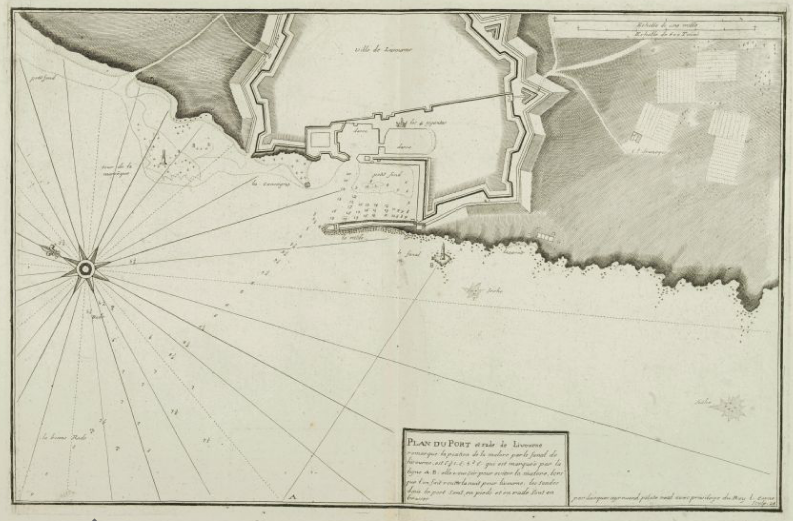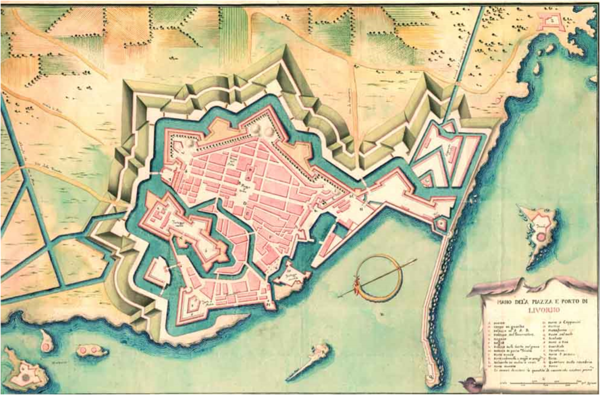MRP: Livorno
Livorno
Editorial history
02/12/11, CSG: Created page
05/12/11, CSG: Uploaded images
27/12/11, CSG: Added hypertext Table of Contents
Contents
Suggested links
Cadiz
Genoa
Malaga
Naples
Messina
Images
Map
Insert Map of situation
Port et Rade de Livorno (Marseilles, 1732-36)
Livorno citadel, C17th
Insert Townscape
Image credits & copyright information
Add Image credits & copyright information
(1) 'Plan du Port et Rade de Livourne', Jacques Ayrouard (Marseilles, 1732-46), 28.5 x 44.3 cm, uncoloured, copper engraving; from ac chart book by Jacques Ayrouard, Recueil de plusieurs Ports .. de la Mer Méditerranée, out of copyright book[1]
(2) Livorno citadel, unknown artist, C17th (Wikimedia, out of copyright)
Town profile: Livorno, 1670
Livorno, 1670: Richard Lassels, A Voyage of Italy
"[Ligorn] From Pisa we went to Ligorn (Portus Liburnus in Latin) through a pleasant Forrest. This is the onely haven the Great Duke hath; and the mouth which letteth in that food which fatteneth this State. We stayed not long here, the season pressing us to be gone, and this town being soon seen. For the town its but little, yet one of the neatest haven towns a man can see. Heretofore it was not sufferable by reason of the bad air, but since Ferdinand the first built it anew, and dryed up the neighboring Fens (gathering much of the water into a cut channel, which goes from hence to Pisa, and carryes great boats) the Town is twice as wholesome, and thrice as rich as it was.
The things I saw in this Town were these. I. The Mole which shuts up the haven. 2. The Lantern which with seven lights guides in ships in the night. 3. The Haven itself where ships lye safe, and the little haven within that, which serves for a withdarwing room to the great haven, where the Gallys retire themselves. 4. The statue of Ferdinand the first in marble, with the Statues in bronze of four slaves at his feet. These are the 4 slaves that would have stoln away a galley and have rowed here themselves alone; but were taken in their great enterprize. 5. The Greek Church. 6. The Castle. 7. The tower in the Sea where they keep gunpowder. 8. The Jews Synagogue. 9. Two windmills which are rare things in Italy, and therefore must have a place here among the rarities of this town.
I found not any Academy of wits here, nor any records of any learned men of this town. All the Latin here is onely Meum and TXXX and their wits are exercised here how to make good bargains, not good books. Indeed what should the Muses do here amongst the horrible noise of chains, of Carts, of balling Sea-men, of clamorous Porters, and where the Slaves of Barbary are able to fright all learning out of the Town with their looks, as all Latin with their Language. Yet I must congess, they study here belle Lettere: for, if the true belle Lettere be Letters of Exchange, your Marchant here, if you present him a Letter of Exchange from his Corresponden, will read it over, and over again, and study upon it, before he give you the Contents of it in Mony."
(Richard Lassels, A Voyage of Italy)[2]
Notes
Mentions of LIvorno in Wiki primary sources
Sir George Oxenden correspondence
Inventories
Law suits
Wills
See Daniel Oxenbridge will (Written 1643/44)
- "I Daniel Oxenbridge of London now resident and merchant in Liverne being at this present in a weake Estate of Body but of good memorie and sound mind"
- "I give One hundred and fiftie pounds to be disposed of accordinge to the discretion of my brother Mr. John Oxenbridge and Mr. Thomas Doubty our Minister here residing ffor or towards the buying of a burying place place for the English nation in Liverne"
- "To Mr. Job Throckmorton foure hundred pounds To his wife a chaine of pearles in my deske containing as I conceive 490 pearles or what they are To my three freinds Mr. Phillip Williams Mr. Charles Longland and Mr. Tho: Doubty one hundred pounds apeece that is three hundred pounds to them three To William Reymes a hundred Dollars To Mr. Robert and Nicholas Abny [sic - this is in printed transcription, clearly it should be "Abdy"] fiftie dollers apeece for apoore remembrance of mee To Mr Samuell Bonnels fiftie pounds sterling To Thomas Dethicke one hundred Dollers To John Collyer three thousand dollers To Leonard Digge fiftie Dollers To Robert Barbor and Edward Rett one hundred dollers apeece To George Dethicke my servant a hundred dollers apeece To Richard Browne one hundred Dollers To John Con fourtie dollers To Joanna woman servant thyrtie dollers To the Governor & Madna ffrana five dollers apeece To Angelina 10 dollers To John Batta the boy five dollers To Sigr Gualtero Vandercoort and his wife ffourtie pounds between them to buy a ring in my remembrance"
- "Witnesses present at the readinge of this Will to Mr. Daniell Oxenbridge in his House on the 6th ffebry 1643 and wee heard him say hee confirmed it as his will being demanded if he confirmed this as his will he answered I doe I doe
francis Read Thomas Barnsly Ralph Duke Thomas Crathorne Robert Barbor Tho: Banks John Bommer
Wee Thomas Doubty Charles Longland Phillip Williams and John Collyer being present with Mr Daniell Oxenbridge on the ffirst day of ffebry about twenty foure houres or a little after did at his request heare him declare Verbatim the words written parte on this and parte on the other syde of this paper in words and desired John Collyer to write them downe to make out of them a will in as good forme as in short time hee could"
Suggested image sources
TERRA DI | LAVORNO | olim | CAMPANIA | FELIX, Joan and Cornelis Blaeu (1640)This map of Livorno was published in 1640 by Joan (1598-1673) and Cornelis Blaeu (1610-1642) in the third volume of the `Atlas Novus'. Blaeu copied the map after an example in the map book `Italia' by the Italian cartographer Giovanni Antonio Magini (1555-1617); http://www.ricsartshop.com/17cmap/1640-Livorno-Italy.html, viewed 17/07/11
Suggested primary sources
Richard Lassels, The Voyage Of Italy, Or A Compleat Journey through Italy: In Two Parts : With the Characters of the People, and the Description of the Chief Towns, Churches, Monasteries, Tombs, Libraries, Pallaces, Villa's, Gardens, Pictures, Statues, and Antiquities. As Also of the Interest, vol. 1 (Paris, 1670)
- Bologna, p. 141
- Genua, p. 82
- Ligorne, p. 232
- Lyons, p. 32
- Marseiles, p. 42
- Pisa, p. 228
- Roanne, p. 32
Suggested secondary sources
- ↑ Reproduced with thanks from website of Paulus Swaen, http://www.swaen.com/item.php?id=9034, viewed 20/12/11
- ↑ Richard Lassels, The Voyage Of Italy, Or A Compleat Journey through Italy: In Two Parts : With the Characters of the People, and the Description of the Chief Towns, Churches, Monasteries, Tombs, Libraries, Pallaces, Villa's, Gardens, Pictures, Statues, and Antiquities. As Also of the Interest, vol. 1 (Paris, 1670), pp. 232-234, http://books.google.co.uk/books?id=65FCAAAAcAAJ&printsec=frontcover#v=onepage&q&f=false, viewed 05/12/11]

